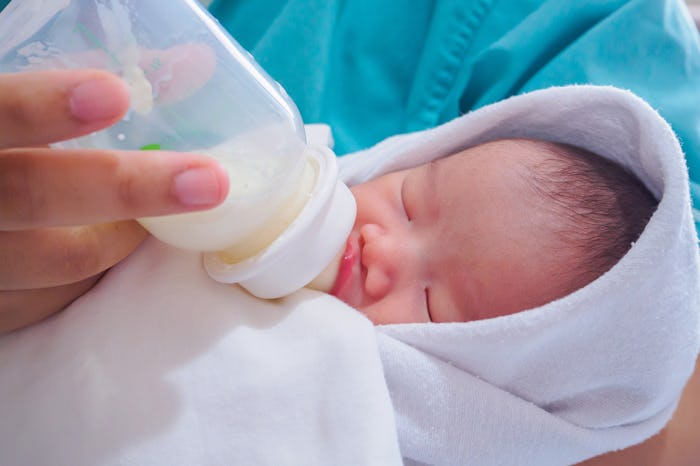Life

5 Common Dangers While Feeding A Newborn
Whether this is your first time as a parent or you're too familiar with spit-up and surprisingly smelly diapers, a new baby levels the playing field of parenthood. Newbies and veterans alike have to adapt to a new sleeping schedule and the cautious way in which you must care for your precious baby. You may not be aware, but there are actually a few common dangers while feeding a newborn that can happen to even the most watchful parent. Thankfully you can quickly learn about the dos and don'ts of feeding, and avoid potential health hazards.
When I first became a mom, I was afraid that every little thing I did was going to hurt my impossibly fragile newborn. Our apartment suddenly felt more like a minefield than a home. But I learned, like most parents do, that babies are stronger than you give them credit for and no one knows it all. In fact, being open enough to admit that you don't have the answers is the first step to learning how to keep your newborn safe in various situations. So if you're not quite sure if your feeding is up to par, then check out these common dangers that can occur while feeding a newborn.
1You Don't Consider Their Airway Size
You might not think about it, but the size of a newborn's airway is about as big around as a drinking straw, according to the official site of the New York State Department of Health. With that statistic in mind, it's not too surprising that choking is a leading cause of fatal accidents in children under a year of age, according to the Centers for Disease Control and Prevention (CDC). That's why it's so important to pay attention to the size and amount you're feeding your baby. My son actually threw up when he began choking on a small clump of powder that I hadn't thoroughly mixed into his bottle of formula. It was scary, but I'll never make that mistake again.
2You Walk And Feed
Being able to do two things at once is typically a good thing, but that's not necessarily the case when it comes to your baby. According to a study published in The International Journal of Environmental Research and Public Health, "falls were the most common cause of non-fatal child injuries," among babies 12 months and under. So think twice the next time you want to balance a bottle and walk at the same time.
3You Engage In Post-Feeding Snuggling
Whether you breastfeed, bottle-feed, or both, it's not unusual for your tiny baby to doze off after their belly is full. But letting your little one sleep on your chest could be dangerous. Since a newborn's airway is easily blocked, you should position their face and head so that their mouth and nose are always unobstructed, as Baby Center noted.
4You Give Them Too Much
It's no surprise babies are small, but just how small are they? According to Baby Center the size of a newborn's stomach can be as small as a cherry or as big as a hen's egg. So it makes sense that you can easily feed your baby too much without even realizing it. According to Kids Health, overfeeding a newborn can cause sleep disturbance, irritability, digestive issues, and excessive weight gain. Make sure you check with your pediatrician about how much you should be feeding your newborn.
5You Don't Wake Them
It might be tempting to let your little one rest without interruption, but it's not a safe practice. As pediatrician Dr. Lance Goodman told CNN, you should never let a newborn sleep through the night without feeding. It's not exactly fun to wake them up for feedings, but just remember that the newborn phase will pass and you will sleep again.